Nursing Reflective Essay: Ethical Dilemma in Clinical Practice
VerifiedAdded on 2022/10/14
|8
|2038
|17
Essay
AI Summary
This reflective essay examines an ethical dilemma encountered during a nursing student's clinical placement in a geriatric ward. The essay details a situation where the student was instructed to force-feed an elderly patient who refused food, exploring the conflict between the supervisor's instructions and the patient's autonomy. Utilizing Driscoll's reflective model, the essay analyzes the ethical implications, emphasizing the importance of patient safety, informed consent, and the nurse's responsibility to uphold ethical standards as defined by the National Competency Standard of Registered Nurse. The essay highlights the violation of patient autonomy, the need for compassionate care, and the legal ramifications of the actions. The reflection concludes with a commitment to future practice, including respecting patient autonomy, adhering to ethical principles, and seeking informed clinical decision-making. The essay references relevant literature, including Australian Law Reform Commission guidelines and the Nursing and Midwifery Board of Australia standards, to support its arguments and illustrate the complexities of ethical decision-making in nursing practice.
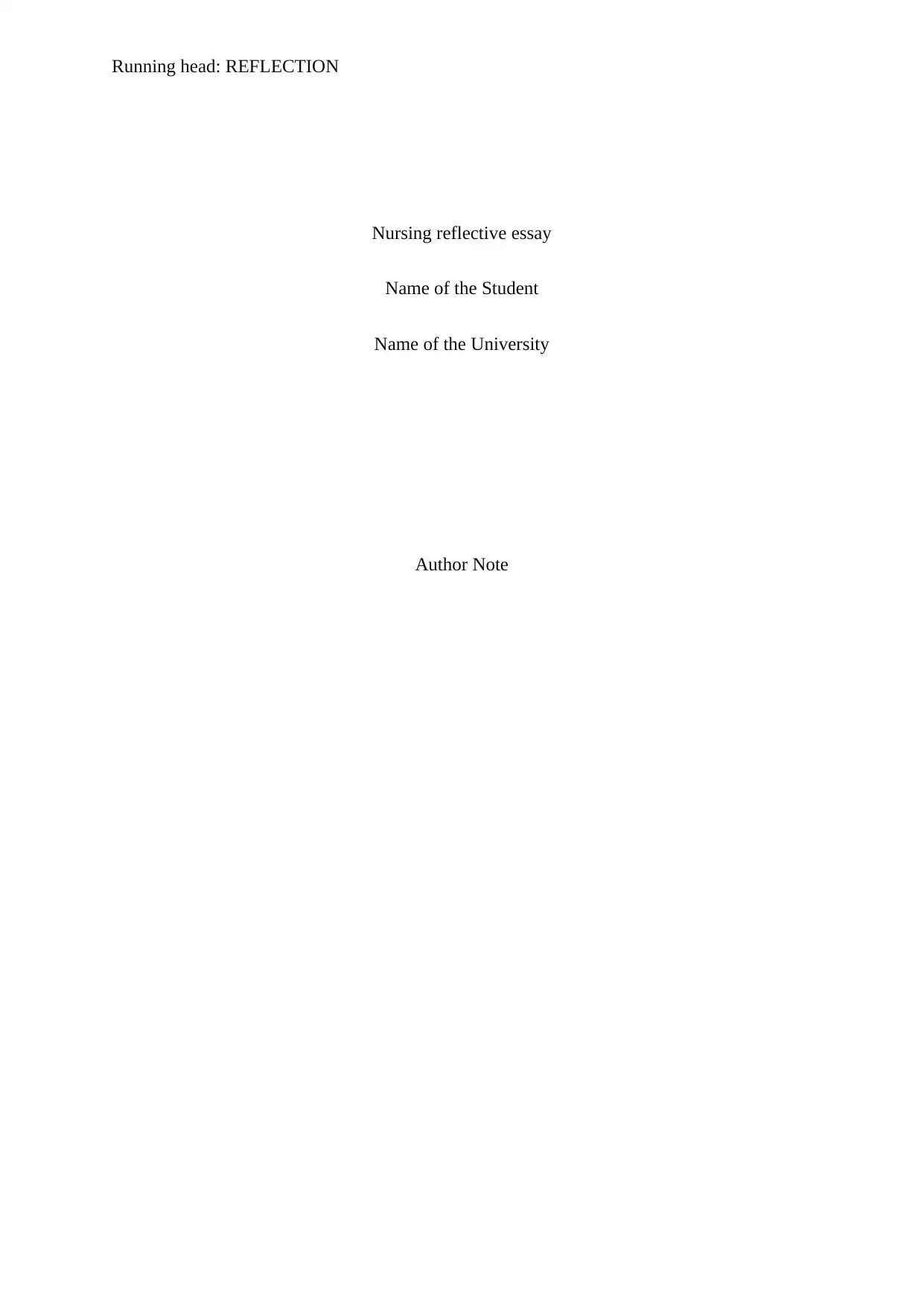
Running head: REFLECTION
Nursing reflective essay
Name of the Student
Name of the University
Author Note
Nursing reflective essay
Name of the Student
Name of the University
Author Note
Paraphrase This Document
Need a fresh take? Get an instant paraphrase of this document with our AI Paraphraser
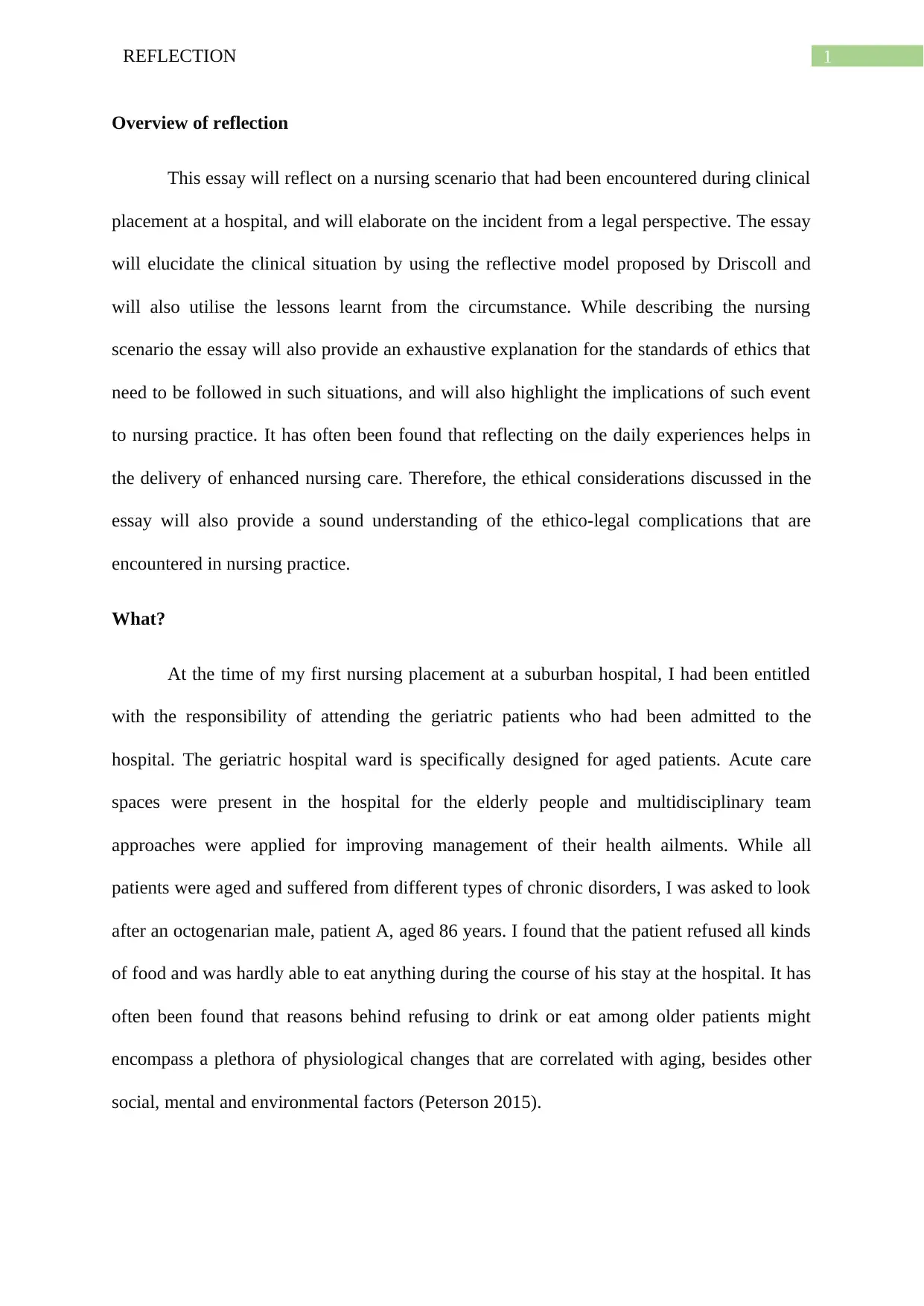
1REFLECTION
Overview of reflection
This essay will reflect on a nursing scenario that had been encountered during clinical
placement at a hospital, and will elaborate on the incident from a legal perspective. The essay
will elucidate the clinical situation by using the reflective model proposed by Driscoll and
will also utilise the lessons learnt from the circumstance. While describing the nursing
scenario the essay will also provide an exhaustive explanation for the standards of ethics that
need to be followed in such situations, and will also highlight the implications of such event
to nursing practice. It has often been found that reflecting on the daily experiences helps in
the delivery of enhanced nursing care. Therefore, the ethical considerations discussed in the
essay will also provide a sound understanding of the ethico-legal complications that are
encountered in nursing practice.
What?
At the time of my first nursing placement at a suburban hospital, I had been entitled
with the responsibility of attending the geriatric patients who had been admitted to the
hospital. The geriatric hospital ward is specifically designed for aged patients. Acute care
spaces were present in the hospital for the elderly people and multidisciplinary team
approaches were applied for improving management of their health ailments. While all
patients were aged and suffered from different types of chronic disorders, I was asked to look
after an octogenarian male, patient A, aged 86 years. I found that the patient refused all kinds
of food and was hardly able to eat anything during the course of his stay at the hospital. It has
often been found that reasons behind refusing to drink or eat among older patients might
encompass a plethora of physiological changes that are correlated with aging, besides other
social, mental and environmental factors (Peterson 2015).
Overview of reflection
This essay will reflect on a nursing scenario that had been encountered during clinical
placement at a hospital, and will elaborate on the incident from a legal perspective. The essay
will elucidate the clinical situation by using the reflective model proposed by Driscoll and
will also utilise the lessons learnt from the circumstance. While describing the nursing
scenario the essay will also provide an exhaustive explanation for the standards of ethics that
need to be followed in such situations, and will also highlight the implications of such event
to nursing practice. It has often been found that reflecting on the daily experiences helps in
the delivery of enhanced nursing care. Therefore, the ethical considerations discussed in the
essay will also provide a sound understanding of the ethico-legal complications that are
encountered in nursing practice.
What?
At the time of my first nursing placement at a suburban hospital, I had been entitled
with the responsibility of attending the geriatric patients who had been admitted to the
hospital. The geriatric hospital ward is specifically designed for aged patients. Acute care
spaces were present in the hospital for the elderly people and multidisciplinary team
approaches were applied for improving management of their health ailments. While all
patients were aged and suffered from different types of chronic disorders, I was asked to look
after an octogenarian male, patient A, aged 86 years. I found that the patient refused all kinds
of food and was hardly able to eat anything during the course of his stay at the hospital. It has
often been found that reasons behind refusing to drink or eat among older patients might
encompass a plethora of physiological changes that are correlated with aging, besides other
social, mental and environmental factors (Peterson 2015).
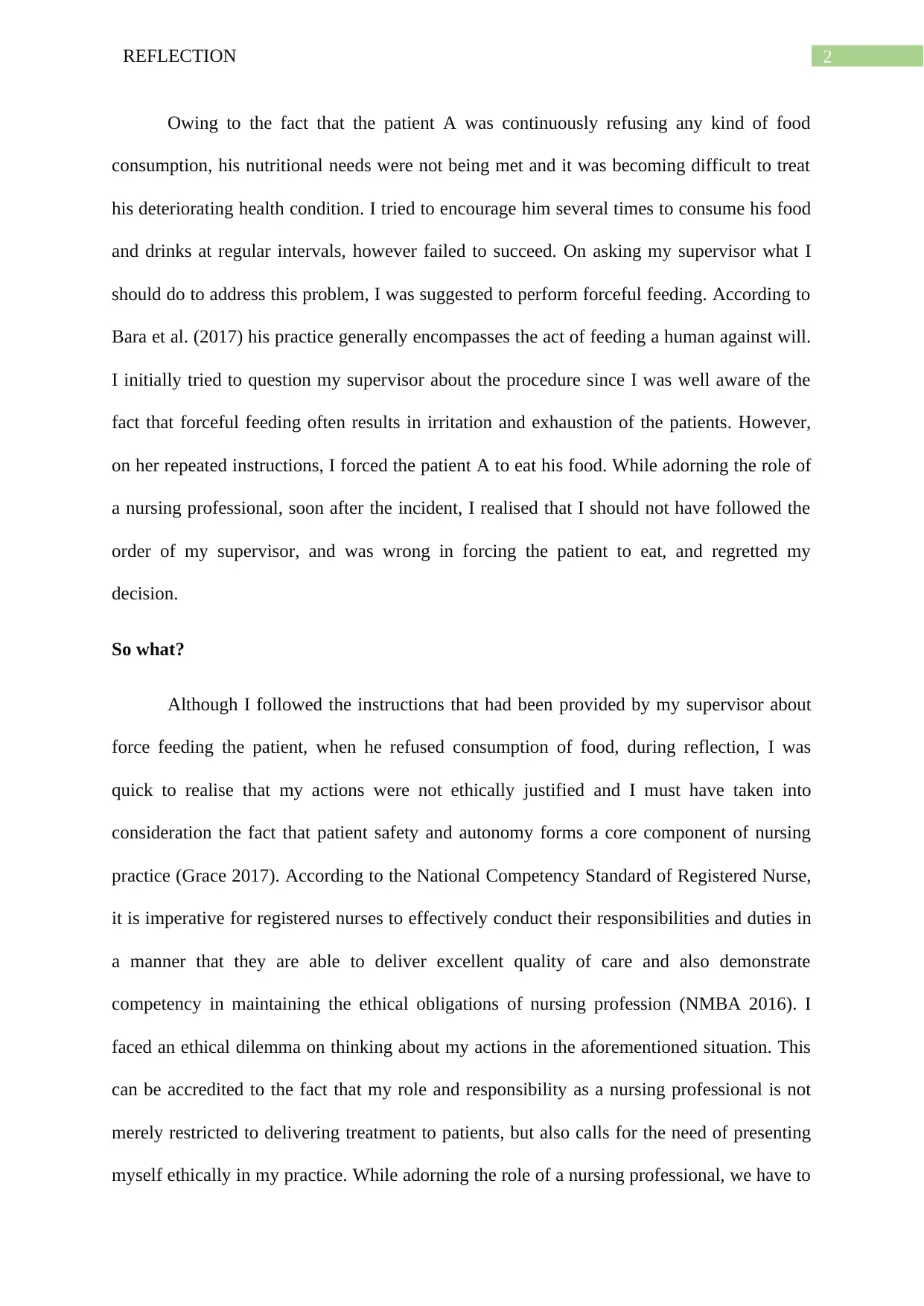
2REFLECTION
Owing to the fact that the patient A was continuously refusing any kind of food
consumption, his nutritional needs were not being met and it was becoming difficult to treat
his deteriorating health condition. I tried to encourage him several times to consume his food
and drinks at regular intervals, however failed to succeed. On asking my supervisor what I
should do to address this problem, I was suggested to perform forceful feeding. According to
Bara et al. (2017) his practice generally encompasses the act of feeding a human against will.
I initially tried to question my supervisor about the procedure since I was well aware of the
fact that forceful feeding often results in irritation and exhaustion of the patients. However,
on her repeated instructions, I forced the patient A to eat his food. While adorning the role of
a nursing professional, soon after the incident, I realised that I should not have followed the
order of my supervisor, and was wrong in forcing the patient to eat, and regretted my
decision.
So what?
Although I followed the instructions that had been provided by my supervisor about
force feeding the patient, when he refused consumption of food, during reflection, I was
quick to realise that my actions were not ethically justified and I must have taken into
consideration the fact that patient safety and autonomy forms a core component of nursing
practice (Grace 2017). According to the National Competency Standard of Registered Nurse,
it is imperative for registered nurses to effectively conduct their responsibilities and duties in
a manner that they are able to deliver excellent quality of care and also demonstrate
competency in maintaining the ethical obligations of nursing profession (NMBA 2016). I
faced an ethical dilemma on thinking about my actions in the aforementioned situation. This
can be accredited to the fact that my role and responsibility as a nursing professional is not
merely restricted to delivering treatment to patients, but also calls for the need of presenting
myself ethically in my practice. While adorning the role of a nursing professional, we have to
Owing to the fact that the patient A was continuously refusing any kind of food
consumption, his nutritional needs were not being met and it was becoming difficult to treat
his deteriorating health condition. I tried to encourage him several times to consume his food
and drinks at regular intervals, however failed to succeed. On asking my supervisor what I
should do to address this problem, I was suggested to perform forceful feeding. According to
Bara et al. (2017) his practice generally encompasses the act of feeding a human against will.
I initially tried to question my supervisor about the procedure since I was well aware of the
fact that forceful feeding often results in irritation and exhaustion of the patients. However,
on her repeated instructions, I forced the patient A to eat his food. While adorning the role of
a nursing professional, soon after the incident, I realised that I should not have followed the
order of my supervisor, and was wrong in forcing the patient to eat, and regretted my
decision.
So what?
Although I followed the instructions that had been provided by my supervisor about
force feeding the patient, when he refused consumption of food, during reflection, I was
quick to realise that my actions were not ethically justified and I must have taken into
consideration the fact that patient safety and autonomy forms a core component of nursing
practice (Grace 2017). According to the National Competency Standard of Registered Nurse,
it is imperative for registered nurses to effectively conduct their responsibilities and duties in
a manner that they are able to deliver excellent quality of care and also demonstrate
competency in maintaining the ethical obligations of nursing profession (NMBA 2016). I
faced an ethical dilemma on thinking about my actions in the aforementioned situation. This
can be accredited to the fact that my role and responsibility as a nursing professional is not
merely restricted to delivering treatment to patients, but also calls for the need of presenting
myself ethically in my practice. While adorning the role of a nursing professional, we have to
⊘ This is a preview!⊘
Do you want full access?
Subscribe today to unlock all pages.

Trusted by 1+ million students worldwide
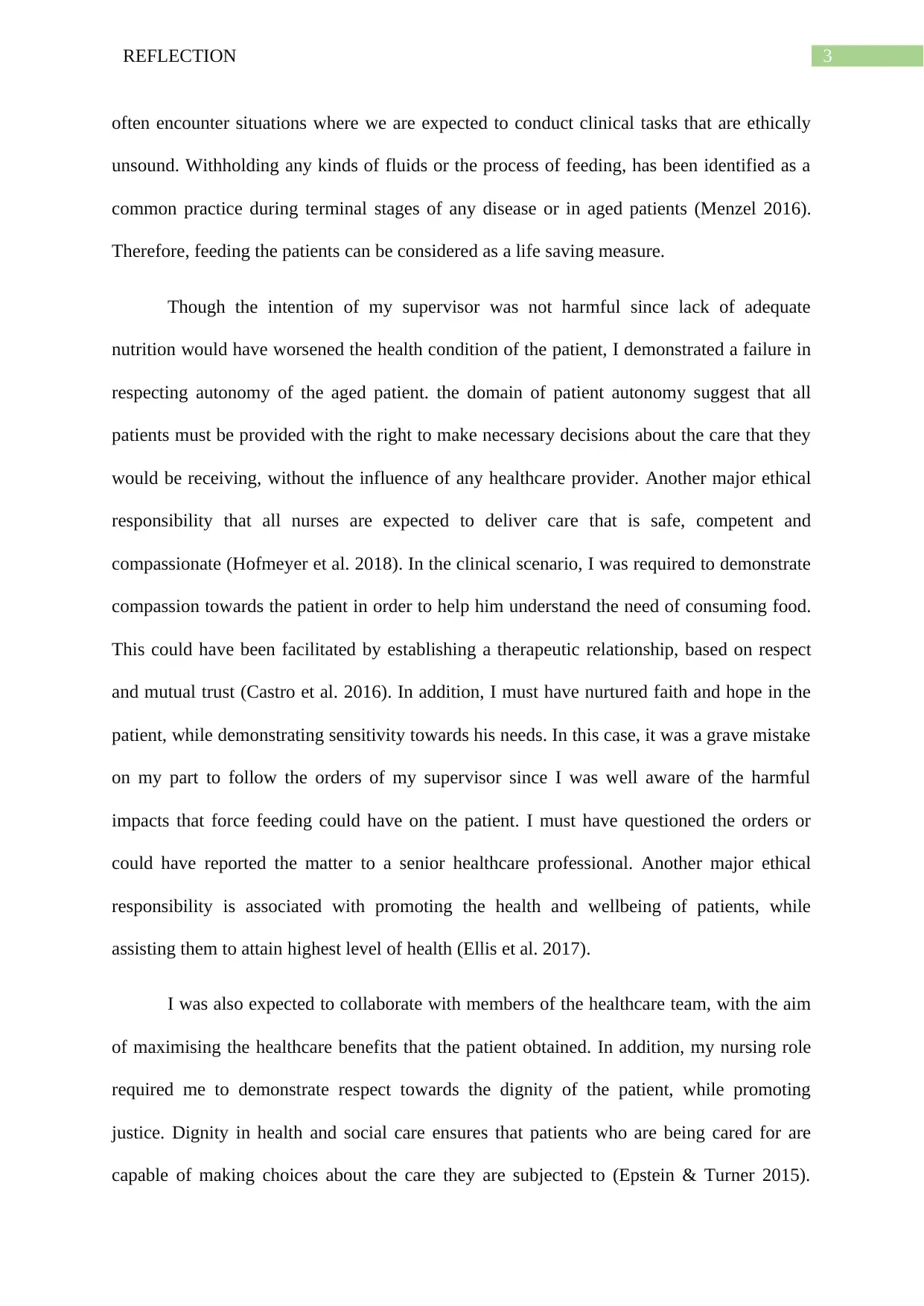
3REFLECTION
often encounter situations where we are expected to conduct clinical tasks that are ethically
unsound. Withholding any kinds of fluids or the process of feeding, has been identified as a
common practice during terminal stages of any disease or in aged patients (Menzel 2016).
Therefore, feeding the patients can be considered as a life saving measure.
Though the intention of my supervisor was not harmful since lack of adequate
nutrition would have worsened the health condition of the patient, I demonstrated a failure in
respecting autonomy of the aged patient. the domain of patient autonomy suggest that all
patients must be provided with the right to make necessary decisions about the care that they
would be receiving, without the influence of any healthcare provider. Another major ethical
responsibility that all nurses are expected to deliver care that is safe, competent and
compassionate (Hofmeyer et al. 2018). In the clinical scenario, I was required to demonstrate
compassion towards the patient in order to help him understand the need of consuming food.
This could have been facilitated by establishing a therapeutic relationship, based on respect
and mutual trust (Castro et al. 2016). In addition, I must have nurtured faith and hope in the
patient, while demonstrating sensitivity towards his needs. In this case, it was a grave mistake
on my part to follow the orders of my supervisor since I was well aware of the harmful
impacts that force feeding could have on the patient. I must have questioned the orders or
could have reported the matter to a senior healthcare professional. Another major ethical
responsibility is associated with promoting the health and wellbeing of patients, while
assisting them to attain highest level of health (Ellis et al. 2017).
I was also expected to collaborate with members of the healthcare team, with the aim
of maximising the healthcare benefits that the patient obtained. In addition, my nursing role
required me to demonstrate respect towards the dignity of the patient, while promoting
justice. Dignity in health and social care ensures that patients who are being cared for are
capable of making choices about the care they are subjected to (Epstein & Turner 2015).
often encounter situations where we are expected to conduct clinical tasks that are ethically
unsound. Withholding any kinds of fluids or the process of feeding, has been identified as a
common practice during terminal stages of any disease or in aged patients (Menzel 2016).
Therefore, feeding the patients can be considered as a life saving measure.
Though the intention of my supervisor was not harmful since lack of adequate
nutrition would have worsened the health condition of the patient, I demonstrated a failure in
respecting autonomy of the aged patient. the domain of patient autonomy suggest that all
patients must be provided with the right to make necessary decisions about the care that they
would be receiving, without the influence of any healthcare provider. Another major ethical
responsibility that all nurses are expected to deliver care that is safe, competent and
compassionate (Hofmeyer et al. 2018). In the clinical scenario, I was required to demonstrate
compassion towards the patient in order to help him understand the need of consuming food.
This could have been facilitated by establishing a therapeutic relationship, based on respect
and mutual trust (Castro et al. 2016). In addition, I must have nurtured faith and hope in the
patient, while demonstrating sensitivity towards his needs. In this case, it was a grave mistake
on my part to follow the orders of my supervisor since I was well aware of the harmful
impacts that force feeding could have on the patient. I must have questioned the orders or
could have reported the matter to a senior healthcare professional. Another major ethical
responsibility is associated with promoting the health and wellbeing of patients, while
assisting them to attain highest level of health (Ellis et al. 2017).
I was also expected to collaborate with members of the healthcare team, with the aim
of maximising the healthcare benefits that the patient obtained. In addition, my nursing role
required me to demonstrate respect towards the dignity of the patient, while promoting
justice. Dignity in health and social care ensures that patients who are being cared for are
capable of making choices about the care they are subjected to (Epstein & Turner 2015).
Paraphrase This Document
Need a fresh take? Get an instant paraphrase of this document with our AI Paraphraser
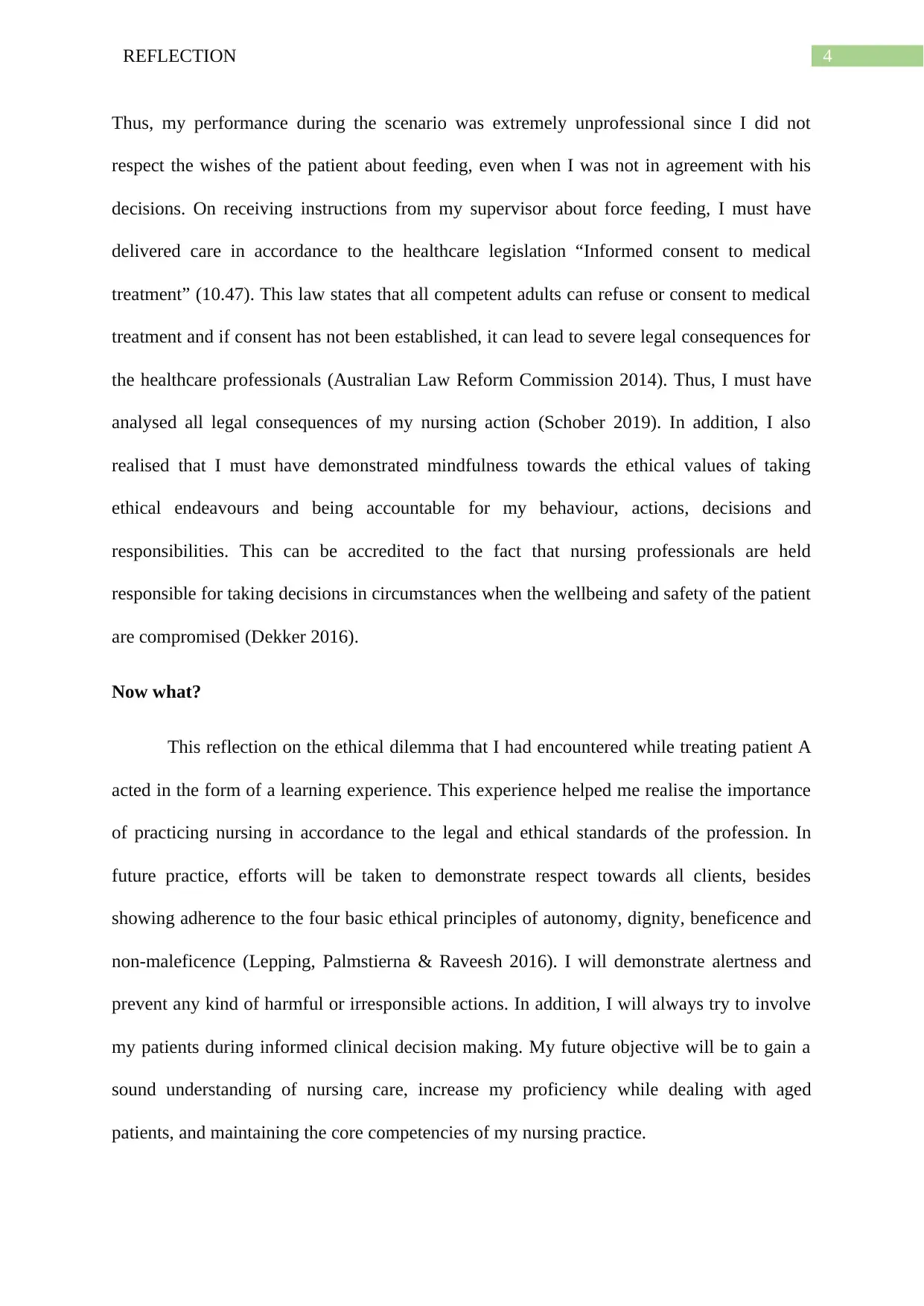
4REFLECTION
Thus, my performance during the scenario was extremely unprofessional since I did not
respect the wishes of the patient about feeding, even when I was not in agreement with his
decisions. On receiving instructions from my supervisor about force feeding, I must have
delivered care in accordance to the healthcare legislation “Informed consent to medical
treatment” (10.47). This law states that all competent adults can refuse or consent to medical
treatment and if consent has not been established, it can lead to severe legal consequences for
the healthcare professionals (Australian Law Reform Commission 2014). Thus, I must have
analysed all legal consequences of my nursing action (Schober 2019). In addition, I also
realised that I must have demonstrated mindfulness towards the ethical values of taking
ethical endeavours and being accountable for my behaviour, actions, decisions and
responsibilities. This can be accredited to the fact that nursing professionals are held
responsible for taking decisions in circumstances when the wellbeing and safety of the patient
are compromised (Dekker 2016).
Now what?
This reflection on the ethical dilemma that I had encountered while treating patient A
acted in the form of a learning experience. This experience helped me realise the importance
of practicing nursing in accordance to the legal and ethical standards of the profession. In
future practice, efforts will be taken to demonstrate respect towards all clients, besides
showing adherence to the four basic ethical principles of autonomy, dignity, beneficence and
non-maleficence (Lepping, Palmstierna & Raveesh 2016). I will demonstrate alertness and
prevent any kind of harmful or irresponsible actions. In addition, I will always try to involve
my patients during informed clinical decision making. My future objective will be to gain a
sound understanding of nursing care, increase my proficiency while dealing with aged
patients, and maintaining the core competencies of my nursing practice.
Thus, my performance during the scenario was extremely unprofessional since I did not
respect the wishes of the patient about feeding, even when I was not in agreement with his
decisions. On receiving instructions from my supervisor about force feeding, I must have
delivered care in accordance to the healthcare legislation “Informed consent to medical
treatment” (10.47). This law states that all competent adults can refuse or consent to medical
treatment and if consent has not been established, it can lead to severe legal consequences for
the healthcare professionals (Australian Law Reform Commission 2014). Thus, I must have
analysed all legal consequences of my nursing action (Schober 2019). In addition, I also
realised that I must have demonstrated mindfulness towards the ethical values of taking
ethical endeavours and being accountable for my behaviour, actions, decisions and
responsibilities. This can be accredited to the fact that nursing professionals are held
responsible for taking decisions in circumstances when the wellbeing and safety of the patient
are compromised (Dekker 2016).
Now what?
This reflection on the ethical dilemma that I had encountered while treating patient A
acted in the form of a learning experience. This experience helped me realise the importance
of practicing nursing in accordance to the legal and ethical standards of the profession. In
future practice, efforts will be taken to demonstrate respect towards all clients, besides
showing adherence to the four basic ethical principles of autonomy, dignity, beneficence and
non-maleficence (Lepping, Palmstierna & Raveesh 2016). I will demonstrate alertness and
prevent any kind of harmful or irresponsible actions. In addition, I will always try to involve
my patients during informed clinical decision making. My future objective will be to gain a
sound understanding of nursing care, increase my proficiency while dealing with aged
patients, and maintaining the core competencies of my nursing practice.
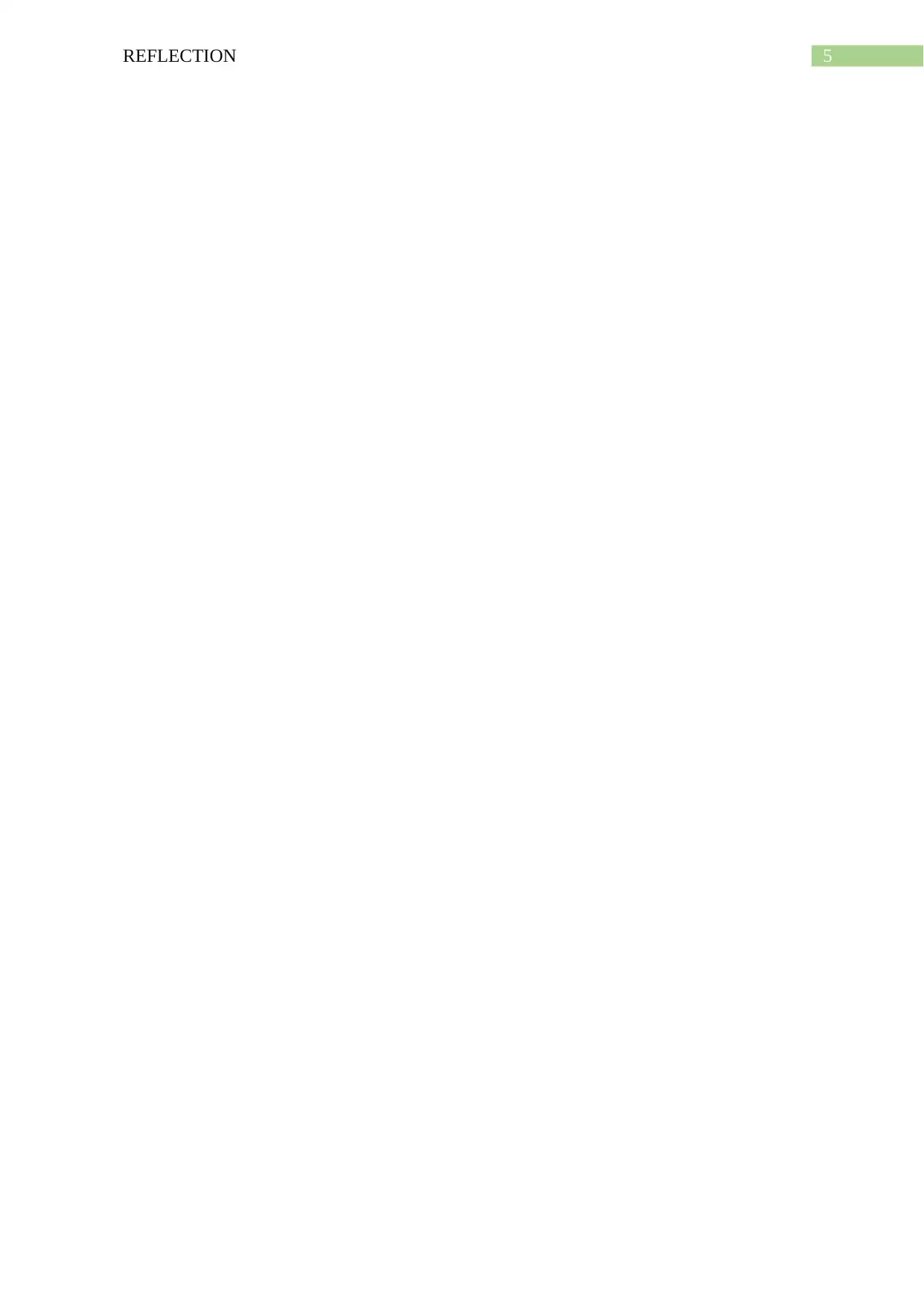
5REFLECTION
⊘ This is a preview!⊘
Do you want full access?
Subscribe today to unlock all pages.

Trusted by 1+ million students worldwide
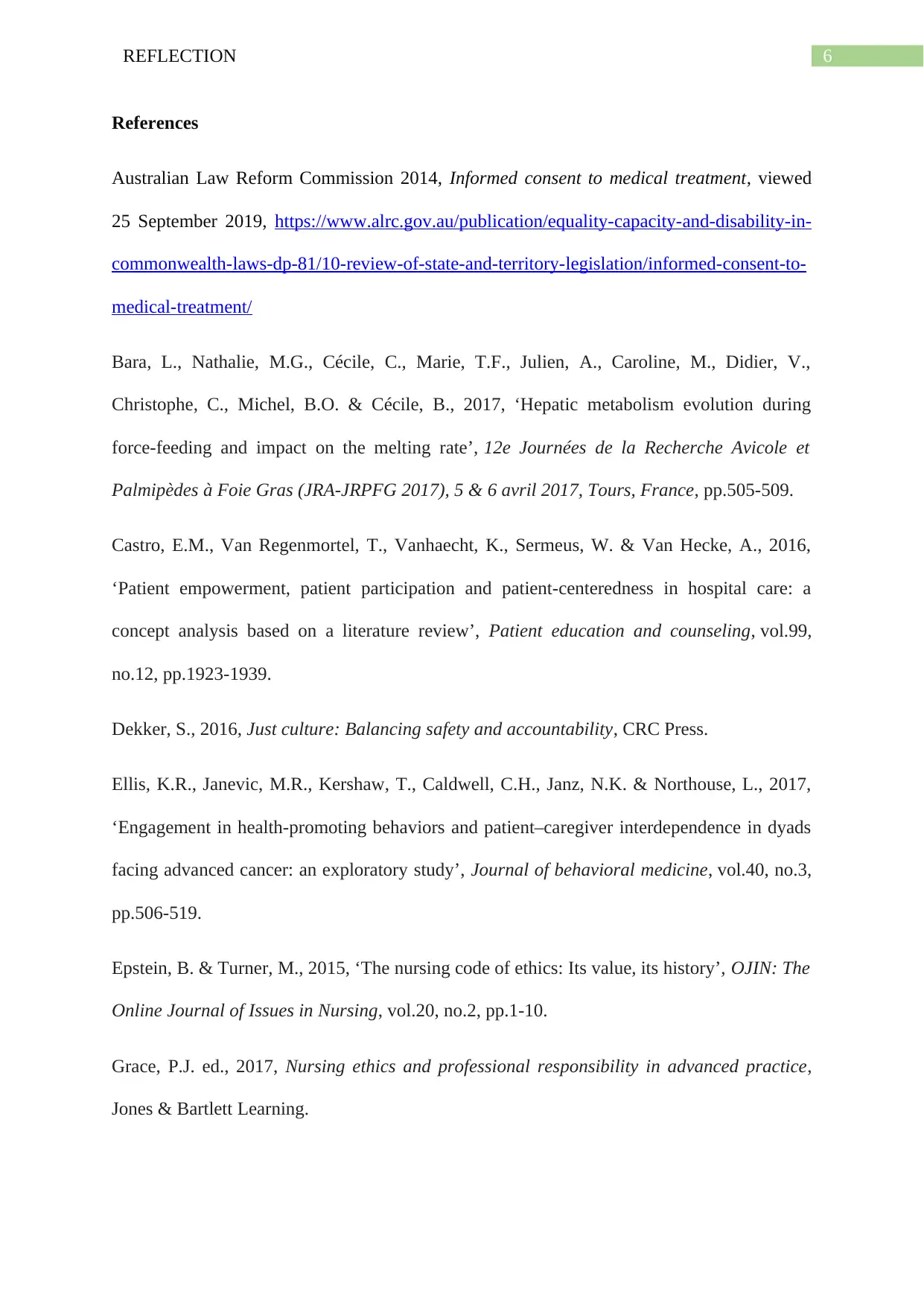
6REFLECTION
References
Australian Law Reform Commission 2014, Informed consent to medical treatment, viewed
25 September 2019, https://www.alrc.gov.au/publication/equality-capacity-and-disability-in-
commonwealth-laws-dp-81/10-review-of-state-and-territory-legislation/informed-consent-to-
medical-treatment/
Bara, L., Nathalie, M.G., Cécile, C., Marie, T.F., Julien, A., Caroline, M., Didier, V.,
Christophe, C., Michel, B.O. & Cécile, B., 2017, ‘Hepatic metabolism evolution during
force-feeding and impact on the melting rate’, 12e Journées de la Recherche Avicole et
Palmipèdes à Foie Gras (JRA-JRPFG 2017), 5 & 6 avril 2017, Tours, France, pp.505-509.
Castro, E.M., Van Regenmortel, T., Vanhaecht, K., Sermeus, W. & Van Hecke, A., 2016,
‘Patient empowerment, patient participation and patient-centeredness in hospital care: a
concept analysis based on a literature review’, Patient education and counseling, vol.99,
no.12, pp.1923-1939.
Dekker, S., 2016, Just culture: Balancing safety and accountability, CRC Press.
Ellis, K.R., Janevic, M.R., Kershaw, T., Caldwell, C.H., Janz, N.K. & Northouse, L., 2017,
‘Engagement in health-promoting behaviors and patient–caregiver interdependence in dyads
facing advanced cancer: an exploratory study’, Journal of behavioral medicine, vol.40, no.3,
pp.506-519.
Epstein, B. & Turner, M., 2015, ‘The nursing code of ethics: Its value, its history’, OJIN: The
Online Journal of Issues in Nursing, vol.20, no.2, pp.1-10.
Grace, P.J. ed., 2017, Nursing ethics and professional responsibility in advanced practice,
Jones & Bartlett Learning.
References
Australian Law Reform Commission 2014, Informed consent to medical treatment, viewed
25 September 2019, https://www.alrc.gov.au/publication/equality-capacity-and-disability-in-
commonwealth-laws-dp-81/10-review-of-state-and-territory-legislation/informed-consent-to-
medical-treatment/
Bara, L., Nathalie, M.G., Cécile, C., Marie, T.F., Julien, A., Caroline, M., Didier, V.,
Christophe, C., Michel, B.O. & Cécile, B., 2017, ‘Hepatic metabolism evolution during
force-feeding and impact on the melting rate’, 12e Journées de la Recherche Avicole et
Palmipèdes à Foie Gras (JRA-JRPFG 2017), 5 & 6 avril 2017, Tours, France, pp.505-509.
Castro, E.M., Van Regenmortel, T., Vanhaecht, K., Sermeus, W. & Van Hecke, A., 2016,
‘Patient empowerment, patient participation and patient-centeredness in hospital care: a
concept analysis based on a literature review’, Patient education and counseling, vol.99,
no.12, pp.1923-1939.
Dekker, S., 2016, Just culture: Balancing safety and accountability, CRC Press.
Ellis, K.R., Janevic, M.R., Kershaw, T., Caldwell, C.H., Janz, N.K. & Northouse, L., 2017,
‘Engagement in health-promoting behaviors and patient–caregiver interdependence in dyads
facing advanced cancer: an exploratory study’, Journal of behavioral medicine, vol.40, no.3,
pp.506-519.
Epstein, B. & Turner, M., 2015, ‘The nursing code of ethics: Its value, its history’, OJIN: The
Online Journal of Issues in Nursing, vol.20, no.2, pp.1-10.
Grace, P.J. ed., 2017, Nursing ethics and professional responsibility in advanced practice,
Jones & Bartlett Learning.
Paraphrase This Document
Need a fresh take? Get an instant paraphrase of this document with our AI Paraphraser
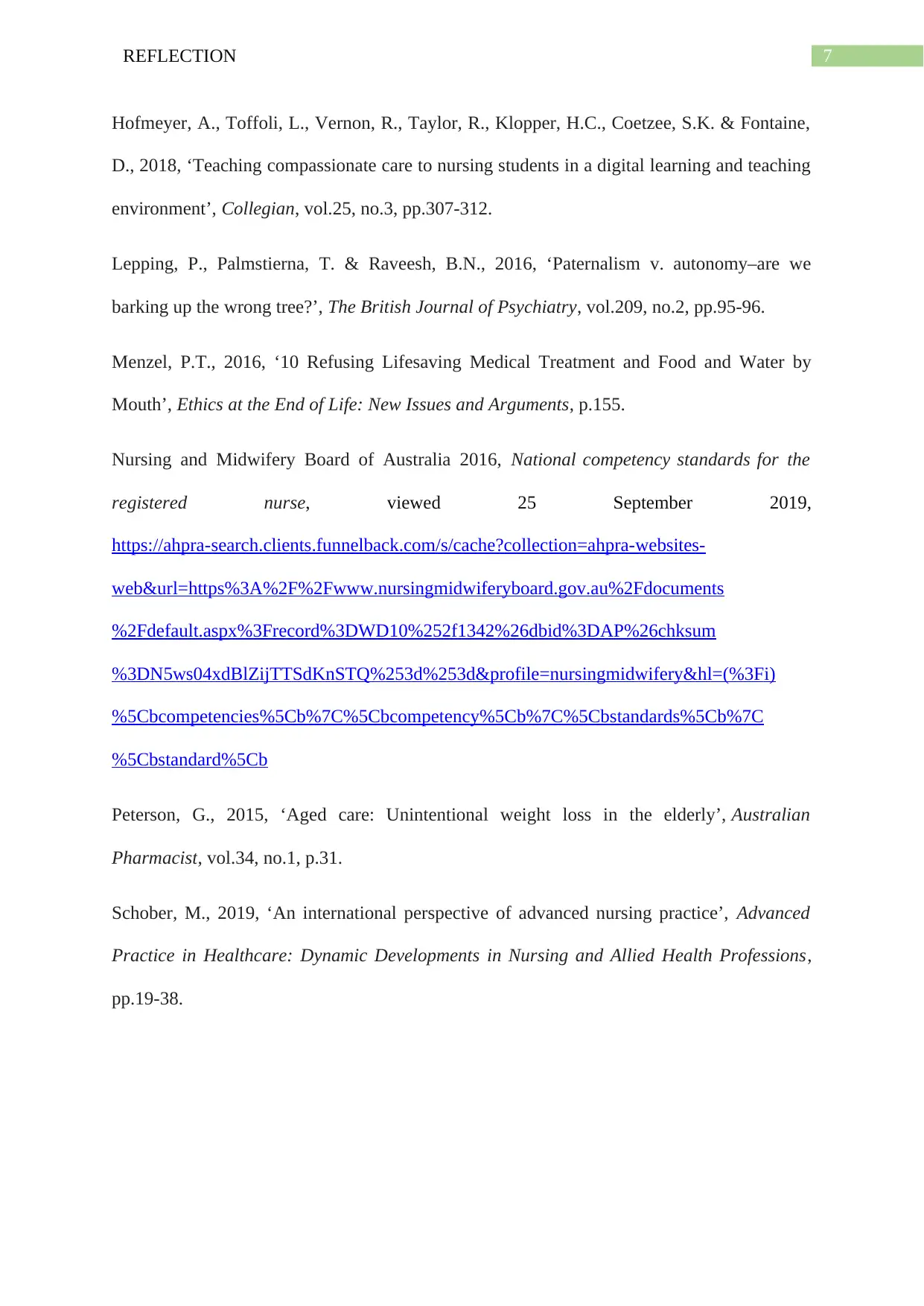
7REFLECTION
Hofmeyer, A., Toffoli, L., Vernon, R., Taylor, R., Klopper, H.C., Coetzee, S.K. & Fontaine,
D., 2018, ‘Teaching compassionate care to nursing students in a digital learning and teaching
environment’, Collegian, vol.25, no.3, pp.307-312.
Lepping, P., Palmstierna, T. & Raveesh, B.N., 2016, ‘Paternalism v. autonomy–are we
barking up the wrong tree?’, The British Journal of Psychiatry, vol.209, no.2, pp.95-96.
Menzel, P.T., 2016, ‘10 Refusing Lifesaving Medical Treatment and Food and Water by
Mouth’, Ethics at the End of Life: New Issues and Arguments, p.155.
Nursing and Midwifery Board of Australia 2016, National competency standards for the
registered nurse, viewed 25 September 2019,
https://ahpra-search.clients.funnelback.com/s/cache?collection=ahpra-websites-
web&url=https%3A%2F%2Fwww.nursingmidwiferyboard.gov.au%2Fdocuments
%2Fdefault.aspx%3Frecord%3DWD10%252f1342%26dbid%3DAP%26chksum
%3DN5ws04xdBlZijTTSdKnSTQ%253d%253d&profile=nursingmidwifery&hl=(%3Fi)
%5Cbcompetencies%5Cb%7C%5Cbcompetency%5Cb%7C%5Cbstandards%5Cb%7C
%5Cbstandard%5Cb
Peterson, G., 2015, ‘Aged care: Unintentional weight loss in the elderly’, Australian
Pharmacist, vol.34, no.1, p.31.
Schober, M., 2019, ‘An international perspective of advanced nursing practice’, Advanced
Practice in Healthcare: Dynamic Developments in Nursing and Allied Health Professions,
pp.19-38.
Hofmeyer, A., Toffoli, L., Vernon, R., Taylor, R., Klopper, H.C., Coetzee, S.K. & Fontaine,
D., 2018, ‘Teaching compassionate care to nursing students in a digital learning and teaching
environment’, Collegian, vol.25, no.3, pp.307-312.
Lepping, P., Palmstierna, T. & Raveesh, B.N., 2016, ‘Paternalism v. autonomy–are we
barking up the wrong tree?’, The British Journal of Psychiatry, vol.209, no.2, pp.95-96.
Menzel, P.T., 2016, ‘10 Refusing Lifesaving Medical Treatment and Food and Water by
Mouth’, Ethics at the End of Life: New Issues and Arguments, p.155.
Nursing and Midwifery Board of Australia 2016, National competency standards for the
registered nurse, viewed 25 September 2019,
https://ahpra-search.clients.funnelback.com/s/cache?collection=ahpra-websites-
web&url=https%3A%2F%2Fwww.nursingmidwiferyboard.gov.au%2Fdocuments
%2Fdefault.aspx%3Frecord%3DWD10%252f1342%26dbid%3DAP%26chksum
%3DN5ws04xdBlZijTTSdKnSTQ%253d%253d&profile=nursingmidwifery&hl=(%3Fi)
%5Cbcompetencies%5Cb%7C%5Cbcompetency%5Cb%7C%5Cbstandards%5Cb%7C
%5Cbstandard%5Cb
Peterson, G., 2015, ‘Aged care: Unintentional weight loss in the elderly’, Australian
Pharmacist, vol.34, no.1, p.31.
Schober, M., 2019, ‘An international perspective of advanced nursing practice’, Advanced
Practice in Healthcare: Dynamic Developments in Nursing and Allied Health Professions,
pp.19-38.
1 out of 8
Related Documents
Your All-in-One AI-Powered Toolkit for Academic Success.
+13062052269
info@desklib.com
Available 24*7 on WhatsApp / Email
![[object Object]](/_next/static/media/star-bottom.7253800d.svg)
Unlock your academic potential
Copyright © 2020–2026 A2Z Services. All Rights Reserved. Developed and managed by ZUCOL.





